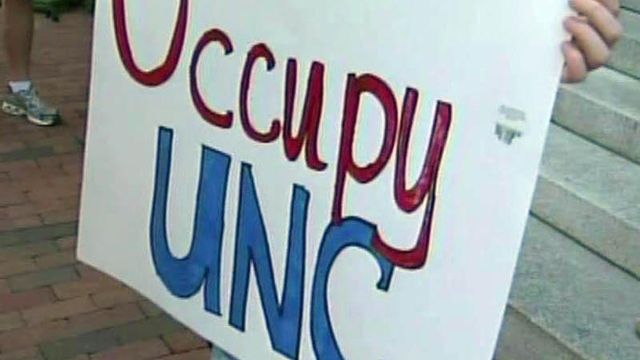Wall Street protests hit NC college campuses
Hundreds of North Carolina college students walked out of class Wednesday afternoon as the weeks-long protest against Wall Street spread to universities nationwide.
Posted — UpdatedDemonstrations started in Manhattan on Sept. 17 but have been expanding across the country in recent days as people expressed anger over the wobbly economy and what they see as corporate greed.
A slice of America's discontented, from college students worried about their job prospects to middle-age workers who have been recently laid off, were galvanized after the arrests of 700 protesters on the Brooklyn Bridge over the weekend.
Duke University, the University of North Carolina at Chapel Hill, North Carolina State University, East Carolina University and UNC-Charlotte were among 140 colleges nationwide where students took part in the so-called Occupy Campus demonstrations.
"Apart from the message of Occupy Wall Street, which is people over profit, is that UNC students, regardless of political or socio-economic background, have issues on this campus," student Denise Mitchell said. "Students just don't feel like they're being heard by the university."
Mitchell cited a recent study that found UNC housekeepers feel they are treated unfairly and an investigation into the Department of African and Afro-American Studies following allegations of plagiarism by a former football player.
About 60 UNC students gathered on the steps of Wilson Library, where Mitchell and others said they wanted to start conversations on addressing problems.
"(We want) to have all of these groups that we have that do great work apart come together and work on the interconnectedness of the issues that we face and how important they are to our future," junior Matt Hickson said.
Students used Facebook and other social media outlets to spread word of the noon protests. They say they represent 99 percent of Americans – people struggling to get by while the wealthiest one percent makes financial decisions.
"People will become aware and will know that we are the 99 percent, and our voices will not be ignored," N.C. State student Katina Gad said.
"If you look at any group of people (who) are being discriminated against, I think youth and students are a big part of that. We've taken on massive amounts of student loans to go into what jobs?" said Ryan Thompson, who helped organize the small protest on N.C. State's Brickyard.
"How are we going to pay $50,000 in debt when there are no jobs out there?" UNC student Ana Maria Reichenbach said.
Another group involved in the protest movement, Occupy Raleigh, plans to hold a meeting in Raleigh's Moore Square at 5 p.m. Sunday and hold a larger protest a week later.
Many of the students said they plan to travel to New York in the next few weeks to show their support in person to the hundreds of protesters on Wall Street.
A few dozen protesters launched the Occupy Wall Street movement last month by pitching tents in front of the New York Stock Exchange. Since then, hundreds have set up camp in a park nearby and have become increasingly organized, lining up medical aid and legal help and printing their own newspaper, the Occupied Wall Street Journal.
About 100 demonstrators were arrested on Sept. 24 and some were pepper-sprayed. Last Saturday, police arrested 700 on charges of disorderly conduct and blocking a public street as they tried to march over the Brooklyn Bridge.
In Manhattan on Monday, hundreds of protesters dressed as corporate zombies in white face paint lurched past the New York Stock Exchange clutching fistfuls of fake money. In Chicago, demonstrators pounded drums in the city's financial district. Others pitched tents or waved protest signs at passing cars in Boston, St. Louis, Kansas City, Mo., and Los Angeles.
• Credits
Copyright 2024 by WRAL.com and the Associated Press. All rights reserved. This material may not be published, broadcast, rewritten or redistributed.






